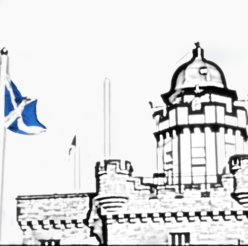Martin Booker
While more and more people are wearing literal face masks, metaphorically it is quite a different picture: For many of the things widely considered normal, routine, and unchangeable, the mask is truly off! Our taken-for-granted reality has been exposed as what it always was, a social construction, not set in stone, but something that can be changed. This includes everyday activities of how we relate to other people, how we do our shopping, how we move through public spaces, how we work in offices and teach in classrooms. But it also applies to bigger issues. There is a growing awareness of the importance of ‘key workers’ that keep our economy going, an almost Marxian awakening that it is not the bosses but the workers that create the value. There has been a shift from a slightly naive version of ‘we’re all in this together’ – often heard in the early stages of the lockdown – to a growing awareness that the pandemic affects people differently and very unequally, and this has a lot to do with class, race and gender. Inequalities and socio-economic conflct lines, hidden as they were behind the thin veneer of ‘normality’, are now more visible than ever.
Call me an optimist, but in all this malaise, there seem to me the beginnings of something that could turn out to be very positive. There is common thread running through all these debates and discourses, a shift in perception, a re-thinking of – and this is what makes me optimistic – the relationship between individual and society. Whether this is about social distancing measures (in which we are all asked individually to contribute to a greater good), our shopping habits (only buying what we need, so there is more left for others), an increased concern for local businesses, a revival of political interest (with citizens eagerly comparing their leaders’ covid responses to those of others), the clap-for-the-carers events, or the surge in volunteering – what all these have in common is that individuals here don’t see themselves as isolated, but within a wider social context. By stealth, there has been a shift in perception, an ontological realignment if you like.
To the sociologist, this brings to mind what C. Wright Mills famously called the Sociological Imagination – as he argued, we should think of our private problems not just as private problems, but also be aware of how they form part of a bigger whole, of public issues. In the times of pandemic this could mean an awareness of how being stuck in my flat all day (my private problem) is important for the wider (public) issue of containing the virus, or, say, you are young and healthy and don’t really have too much to fear from the virus personally, but still feel the need to socially distance, out of solidarity with those more at risk. A growing interest in statistics and data, too, shows an increased attention to the bigger picture beyond one’s personal experience. And while we are all sitting in our living rooms twiddling thumbs, learning new hobbies, struggling to be productive, writing blogs, or dealing with writing block, we know exactly that so many others are doing the same, for the same reasons, an army of stay-at-homers, a collective fate of sorts.
This, of course, is not just a shift in perception. It is also an increase in understanding. Our lives have always been, and will always be, shaped by our social contexts. As sociologists, we’re in the business of pointing this out. And, of course, we can only shape these contexts in positive ways if we are aware of them, and of how they work. The mask is off for now. Things will go back to some kind of normal at some point. Here is hoping, however, that this shift in awareness is real, and will last.
Martin Booker is Teaching Fellow at Edinburgh University. He is writing from Abbeyhill, Edinburgh, and has found a new appreciation for the wild beauty of Holyrood Park, for his socially-distanced daily exercise.
